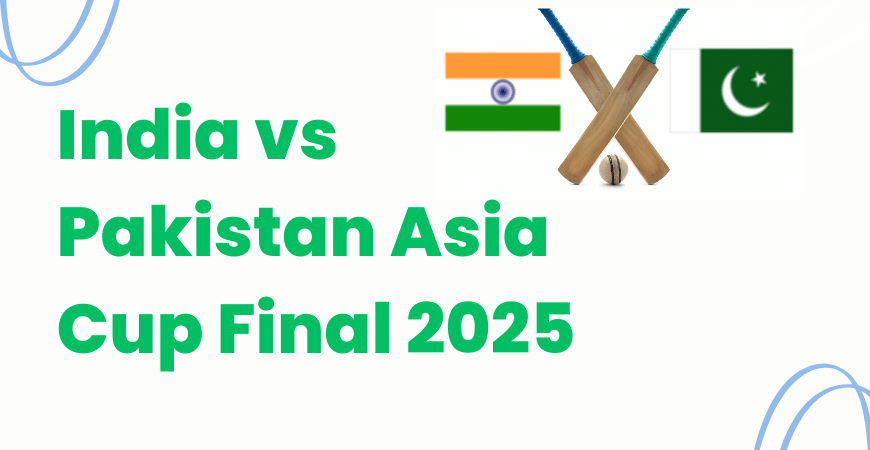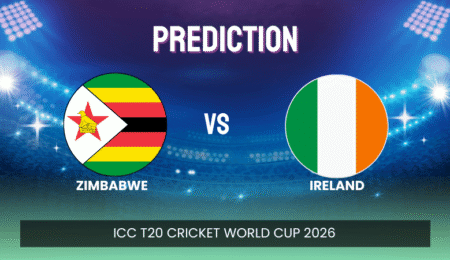India vs Pakistan Asia Cup Final 2025 – Match Recap
India vs Pakistan Asia Cup Final 2025 – Full Match Highlights and Analysis
In what will surely go down as one of the most dramatic chapters in South Asian cricketing history, India edged out Pakistan by five wickets with two balls to spare in the 2025 Asia Cup final, held at the Dubai International Cricket Stadium on 28 September 2025.
This match was historic not just for the result, but for the sheer intensity of the on-field battle, spiced with off-field drama and political undertones. It was the first time India and Pakistan clashed in an Asia Cup final since the tournament’s inception. Wikipedia
The Build-Up: Expectation, Tension, and Narrative
From the moment the tournament began, this edition of the Asia Cup carried more weight than usual. India entered the final unbeaten in the tournament and had already defeated Pakistan twice in the group and Super 4 stages.
For Pakistan, the final was a chance for redemption. Having shown flashes of brilliance, the team’s challenge was to maintain composure under pressure and deliver when it mattered most.
Yet, the final was not just a cricket match — it was imbued with political tension. The backdrop of recent skirmishes between the two nations meant that every handshake, every trophy presentation, every gesture was laden with symbolism.
As the teams prepared for the toss, the atmosphere was electric. There was no handshake between captains, a sign of the chilled relations, reportedly guided by the match referee’s instructions. India’s captain Suryakumar Yadav won the toss and chose to bowl first, replicating the strategy used in earlier encounters in the tournament.
First Innings: Pakistan’s Promising Start and Spectacular Collapse
Pakistan’s innings began with promise. The openers Sahibzada Farhan (57 off 38 balls) and Fakhar Zaman (46 off 35) built a solid foundation, putting the pressure back on the Indian bowlers. At one point, the score was 113 for 1 — the kind of platform that seemed likely to translate into a big total.
But from that position, Pakistan’s innings spiraled into collapse. They lost nine wickets for just 33 runs, folding to 146 all out in 19.1 overs.
The architect of that collapse was India’s left-arm wrist-spinner Kuldeep Yadav, whose spell of 4 for 30 became decisive in dismantling Pakistan’s middle and lower order. In support, Varun Chakravarthy, Axar Patel, and Jasprit Bumrah picked up crucial wickets, ensuring that Pakistan’s innings never regained momentum.
As Pakistan’s collapse unfolded, stunned spectators and fans watched in disbelief — what had begun as a promising innings descended into a dramatic unraveling.
Second Innings: India’s Rocky Start, Steely Resolve, and Triumphant Finish
Chasing 147 runs, India’s start was anything but smooth. The top order tumbled quickly: the score was just 20 for 3. But between the chaos, Tilak Varma stood tall.
He anchored the innings with a composed, mature knock of 69 not out off 53 balls — a performance that earned him the Man of the Match honors. His innings, studded with three fours and four sixes, provided the backbone India desperately needed.
Supporting him was a quickfire 33 off 22 balls from Shivam Dube, as the duo put together a vital partnership of about 60 runs for the fifth wicket. Their synergy and calm under pressure were pivotal.
As the match hurtled toward its climax, tension soared. With India needing two runs off three balls, Rinku Singh, facing his only ball in the tournament, produced the magic — a boundary that sealed the win with two balls to spare. The equation ended at 150/5 in 19.4 overs.
In short, what started as a shaky chase transformed into a thrilling finish, thanks largely to the composure of Varma and Dube, and the tactical patience of the Indian side under pressure.
The Aftermath: Celebration, Controversy, and Silence
Victory, however, did not come with the usual pomp and protocol.
India refused to accept the trophy or winners’ medals from Mohsin Naqvi, the chairman of the Pakistan Cricket Board and Asian Cricket Council (ACC), who is also Pakistan’s interior minister. As a result, the formal presentation was delayed, then significantly shortened, and certain award rituals were omitted or modified.
The emotional charge was palpable: there were no handshakes between the teams, neither at the toss nor after the match. Videos circulated of Indian players staging a mock trophy presentation, celebrating with an imaginary trophy in a pointed display of defiance. The move sparked debates across the cricketing world about sport, diplomacy, and ethics.
BCCI hinted at lodging a formal protest with the ICC over Naqvi’s involvement in the trophy presentation, citing conflict of interest. India’s Prime Minister and President publicly praised the team’s grit and resolve. Meanwhile, the Pakistani side expressed disappointment, particularly at their batting collapse which they admitted cost them the match.
From a sporting perspective, the result extended India’s dominance over Pakistan in this tournament — a clean sweep of all three matches. It also gave India their ninth Asia Cup title (across formats) and their second in T20 format.
Key Takeaways & Legacy
This final will be remembered on multiple fronts:
1. Bowling made the difference
Pakistan’s collapse was engineered by India’s spin attack, especially Kuldeep. When the surface was under control and the pressure rising, India’s bowlers seized the moment.
2. Middle-overs mastery
In a chase that began disastrously, the recovery via Varma and Dube was critical. Their calculated aggression and mental strength under pressure exemplify modern T20 batting sensibilities.
3. Power of composure
A high-stakes game between intense rivals requires nerves as much as skill. India’s approach, particularly how they managed the last few overs, showed maturity.
4. Sport & Politics Intersect
The refusal to accept the trophy from an ACC official from Pakistan, the absence of traditional handshake rituals, and the mock celebrations all underlined how in South Asia, cricket cannot always be divorced from the political realities between the two nations.
5. A milestone in Asia Cup history
This was the first India-Pakistan Asia Cup final ever. That it ended in such climax — both on-field and off-field — ensures it will be discussed for decades.
Conclusion
The 2025 Asia Cup Final will not be remembered merely as a cricket match, but as an emblem of rivalry, drama, and resilience. India’s slim but thrilling victory over Pakistan will be etched in memory not only for the runs and wickets but also for what unfolded off the field.
In the desert night at Dubai, amid tension and expectation, the “Men in Blue” held the trophy — at least symbolically — and sealed another chapter in this epic saga. For Pakistan, the heartbreak lies in what might have been. For cricket purists everywhere, it was a spectacle: raw, emotional, and unforgettable.
Match Highlights:
Read Also: India vs Sri Lanka Asia Cup 2025 Highlights



